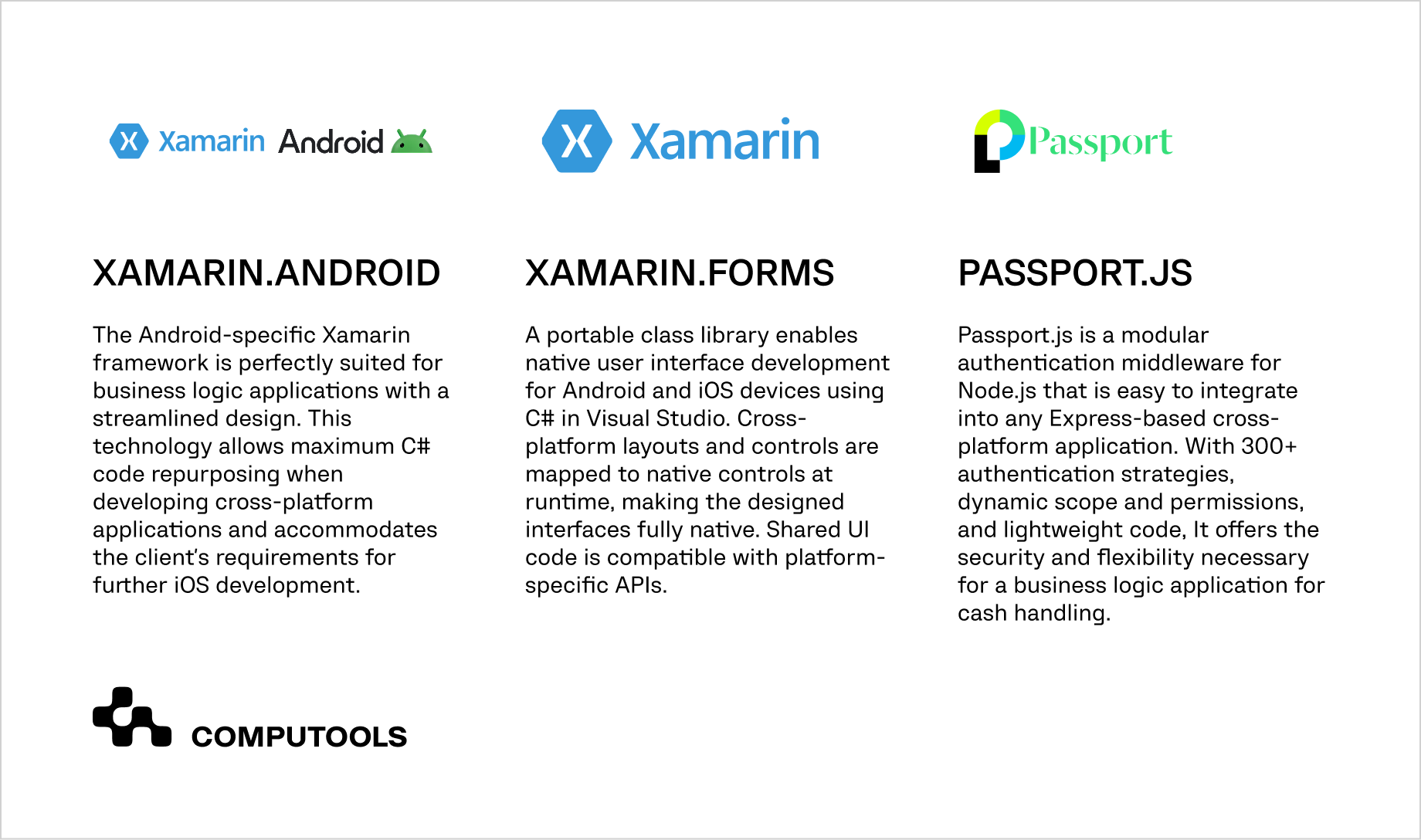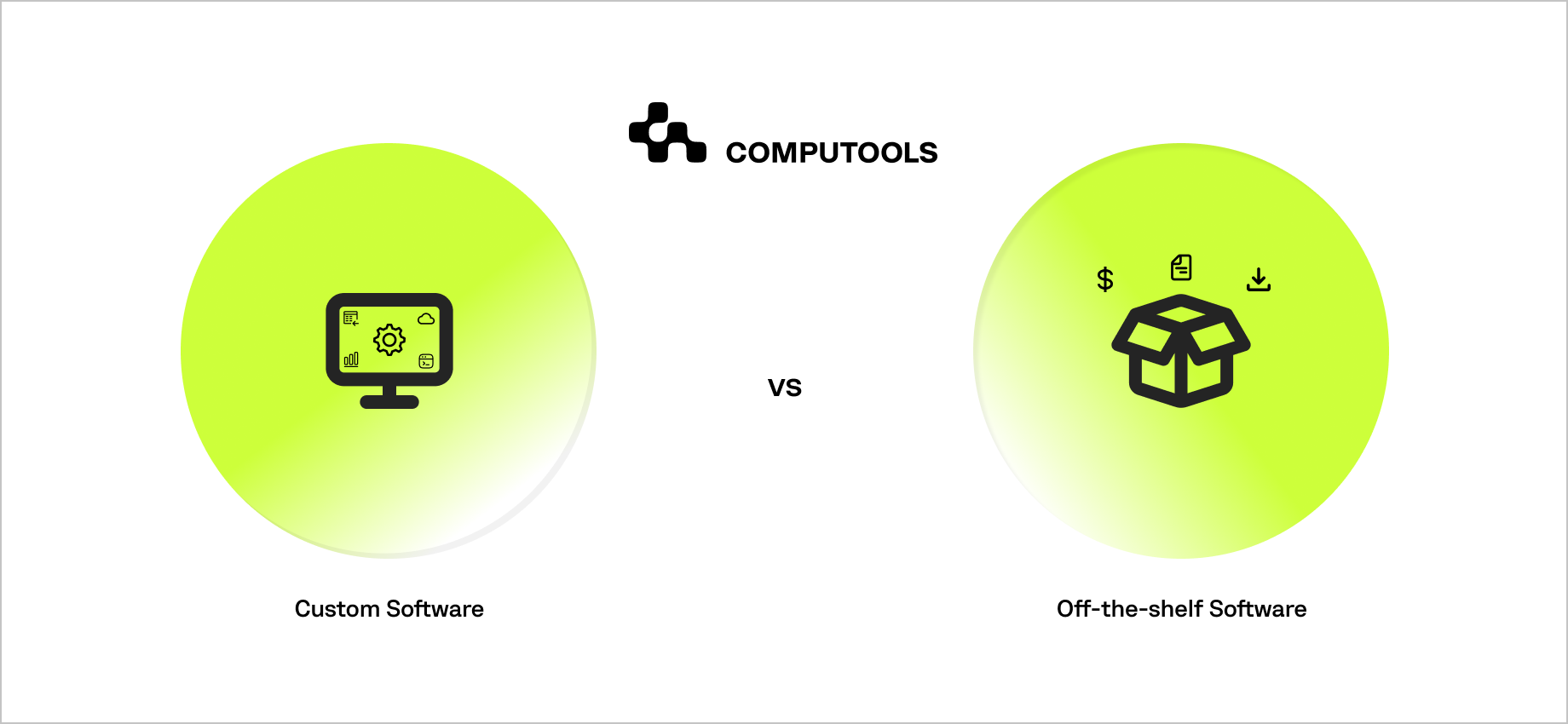The global POS market is expanding rapidly, projected to reach over $180 billion by 2030, with software alone expected to surpass $54 billion by 2034. This surge is driven by the growing demand for mobile and cloud-based payment systems, real-time analytics, and integrated retail operations.
As retailers scale, their POS systems evolve from simple transaction tools into complex ecosystems connected with ERP, CRM, inventory, and loyalty platforms, shaping the foundation of custom retail software solutions.

However, this rapid evolution exposes a critical challenge: deciding between custom POS vs off-the-shelf systems like Square, Clover, or Lightspeed. Pre-built tools promise quick setup but often limit flexibility, integration, and scalability. Retailers with unique workflows or hardware, such as cash-handling devices or IoT integrations, face rising costs and operational friction when adapting these systems.
The result: a growing push toward tailored, extensible POS architectures that align seamlessly with business strategy.
Computools helps retailers navigate this decision through tailored POS development services that combine deep technical expertise with industry insight. Our approach focuses on evaluating every company’s build vs buy POS strategy to ensure scalability, flexibility, and long-term ROI.
In one of our projects, Computools partnered with a global retailer to create a custom POS that replaced fragmented off-the-shelf systems with a unified, data-driven platform connecting stores, warehouses, and digital channels in real time.
How Computools helped a global manufacturer build a custom POS
The client, a leading manufacturer of cash-handling equipment, faced a major challenge: their outdated mobile app was slow, cluttered with features, and built for Windows Phone, a platform no longer widely used. They needed a modern solution to manage cash collection, validation, and counting efficiently, without compromising security or performance. Computools, leveraging extensive experience in transformation services, stepped in to build a fully custom POS system from scratch.
Instead of trying to adapt an off-the-shelf platform like Square or Clover, we developed a cross-platform mobile application using Xamarin. Android and Xamarin.Forms, ensuring smooth operation on both Android and iOS devices.
Passport.js handled secure authentication, while SQLite ORM and iTextSharp streamlined data management and PDF handling. Every part of the app was crafted with the user in mind, from intuitive navigation to a sleek interface that simplified complex cash-handling workflows.

This project demonstrates why building a custom POS can outperform off-the-shelf solutions: it aligns perfectly with the client’s processes, integrates seamlessly with existing hardware and IoT devices, and allows complete control over functionality and future upgrades. The result was a faster, safer, and more reliable system, something that generic platforms cannot match.
This experience is the reason we are writing this article. With hands-on expertise in digital transformation services, Computools has the qualifications and experience to guide retailers in deciding when to build a custom POS versus adopting off-the-shelf solutions.
We have implemented real-world systems that integrate security, efficiency, and scalability, proving that the right custom solution can revolutionize operations and improve the customer experience.
Looking to enhance your POS with loyalty and customer experience tools? Explore our list: Top 25 Loyalty & Customer Experience Software Development Firms for Retail.
Build vs buy POS: custom vs. off-the-shelf

Investing in the right POS system has a direct impact on business performance. When considering build vs buy POS, it’s essential to evaluate speed of deployment and budget, as well as long-term ROI, ease of use for employees and customers, and scalability.
Custom POS Software
Custom POS systems are built from scratch to meet a business’s individual needs. This enables the creation of tailor-made solutions that integrate workflows, loyalty management, real-time inventory, automatic stock replenishment, and more, all within a single platform.

When to consider custom development:
• Your business is complex or highly specific.
• Workflows are dynamic and need frequent updates.
• Multiple tools must be integrated across processes.
• You need gradual learning curves for employees or customers.
• You manage personalized or sensitive data.
• Your company requires digitization, process automation, or IT upgrades.
• Scalability and long-term growth are priorities.
Examples: Amazon, eBay, YouTube, Netflix, Uber all rely on custom or heavily customized software to maintain a competitive edge.
Off-the-Shelf POS Systems
Off-the-shelf POS systems comparison shows that ready-made solutions provide standard functionality for most businesses, including payment processing, basic inventory management, reporting, and integration with popular payment gateways.
Their advantages include:
• Quick setup and minimal technical requirements
• Familiar interface for staff and customers
• Cost-effectiveness for startups or small businesses
For many companies, off-the-shelf solutions are optimal because they allow a fast start with reliable software.
However, there are limitations:
• May not adapt to unique business processes
• It can be challenging to integrate with existing hardware or IoT devices
• Limited options for additional features, which can reduce differentiation at checkout

Building a POS system is often considered when businesses want a solution tailored to their needs. Typical use cases include startups, cost-conscious SMEs, companies with limited IT resources, and businesses seeking rapid market entry. Common examples of off-the-shelf software include Gmail, Photoshop, Tally, Norton, and CRM systems like HubSpot.
Our experience with the CCI Assistant project demonstrates this approach in practice. Computools built a fully custom POS system that integrated seamlessly with the client’s cash-handling processes, enhancing performance and improving the user experience, delivering long-term value that off-the-shelf solutions could not match.

Choosing between off-the-shelf and custom software solutions depends on business priorities. If speed to market and basic functionality are key, an off-the-shelf POS may be the right choice. If flexibility, scalability, and full control over operations are critical, choosing to build your own POS system provides long-term ROI and a competitive edge.
Before making a decision, it’s essential to understand the differences in cost, flexibility, and long-term potential between customized and ready-made systems. The table below highlights the main differences between the two approaches.
| Custom POS software | Off-the-Shelf POS Software | |
| Time to Market | Longer development may take several months | Fast, ready to launch almost immediately |
| Cost | Higher upfront investment | Lower upfront cost subscription or one-time fee |
| Flexibility | Fully adaptable to business processes | Limited fixed features with minimal customization |
| Scalability | Easily scalable as the business grows | May struggle to adapt to new needs |
| Integration | Seamless with existing systems and IoT devices | Limited depends on available APIs/plugins |
| Control & Security | Full control over data and updates | Controlled by the vendor, less flexible |
| Competitive Advantage | Unique features and customized customer experience | Less differentiation from competitors |
Off-the-shelf solutions deliver quick results, but custom-built systems offer deeper adaptability and control, qualities that often define long-term business growth.
Want to leverage IoT for smarter grocery retail operations? Check out our guide: How to Design Data Pipelines for IoT in Grocery Retail.
Choosing an off-the-shelf POS: Square, Clover, or Lightspeed?
If you decide to go with an off-the-shelf system instead of building your own, the next step is choosing the right platform for your business. The market leaders Square, Clover, and Lightspeed offer similar core features, but their strengths differ depending on your priorities.
Lightspeed is a powerful option for retailers and restaurants that rely on deep inventory management, real-time stock tracking, and integrated eCommerce. It supports omnichannel operations and advanced analytics, helping businesses unify online and offline sales.
Clover is ideal for small to mid-sized businesses that prioritize simplicity and speed. It delivers essential tools for payment processing, basic inventory control, and customer management, suitable for quick deployment without extensive customization.
Square shines for startups and mobile-first companies thanks to its low cost, intuitive interface, and strong ecosystem of integrations. It’s particularly effective for service-based businesses and pop-up retailers that need flexibility.
When comparing Square vs Clover vs Lightspeed POS, consider your growth plans and technical capabilities. While ready-made systems are convenient, adding custom integrations or extending functionality through mobile app development can help bridge the gap between standard tools and your specific business workflows.
Let’s take a closer look at the POS software alternatives to understand how each system performs across key areas like functionality, integration, and support.
| Square | Clover | Lightspeed | |
| Best for | Startups, pop-ups, small retail and service businesses | Small to mid-size stores and restaurants | Multi-store retailers and growing restaurant chains |
| Monthly Subscription | Free (transaction fees apply) | Retail Starter: $13–$16/mo, Quick Service Starter: $105/mo, Full Service Starter: $165/mo; Professional Services Starter: $14.95/mo (software-only) | Retail: $89–$269, Restaurant: $69–$399 |
| Free Trial Duration | 90 days (software-only, virtual terminal) | 90 days (software-only, virtual terminal) | 30 days |
| Ease of Use | Very easy, intuitive | User-friendly with some learning curve for advanced features | Easy to use, but more complex due to advanced features |
| Inventory Management | Basic inventory, analytics, item tracking, third-party integrations | Advanced inventory via Shopventory: bulk edits, sales trends, expiration tracking, profit-cost calculation | Advanced inventory: product variants, serial numbers, bundling, multi-location, vendor management, online order tracking |
| Integrations | Strong third-party integrations and analytics | Limited eCommerce compared to Shopify; integrates with Clover apps for payments, CRM, staff & inventory management | QuickBooks, Xero, WooCommerce, Mailchimp, BigCommerce, NuORDER, ERP, marketing tools |
| Scalability | Suitable for small to medium businesses | Small to mid-size stores and restaurants; hardware & software packages for larger setups | Highly scalable for multi-location enterprises |
| Customization | Limited | Moderate with add-ons | Extensive support for deep integration and API access |
| Processing Fees | 2.6% + $0.15 per transaction | 2.3–2.6% + $0.10 card-present; 3.5% + $0.10 keyed-in or card-not-present | 2.6% + $0.10 per transaction via Lightspeed Payments |
| Offline Functionality | Limited offline mode | Limited offline mode | Partial offline mode; syncs data when online |
| Support | Online help center, email, phone | Helpdesk & helpline; 24/7 support for free trial users, but POS live chat is unavailable | 24/7 global support, dedicated onboarding, and an account manager for Enterprise |
| Omnichannel Capabilities | Good integrates with Square Online | Decent, some integrations are needed | Excellent unified platform for online and offline sales |
| Pros | Free to start, stylish hardware, strong analytics, and support businesses of all sizes. | Good hardware options, strong analytics, CRM & loyalty tools included, advanced inventory, extensive staff & table management | Powerful inventory management, scalable, and extensive integrations |
| Cons | Some features incur additional costs, including transaction fees for keyed-in payments, and support varies depending on the plan. | It can be pricier, limited integrations, and some advanced features require learning. | Learning curve, higher software fees, long-term contracts |
Ultimately, investing in POS system scalability and customization ensures your POS grows alongside your business, adapting to future needs with ease.

Learn how to design a POS strategy that balances cost, customization, and connected customer experiences.
Common mistakes businesses make when choosing a POS
Many businesses struggle with the build vs. buy POS decision, and mistakes are common. Avoid these common traps.
1. Choosing based only on price
Cheaper isn’t always better. While off-the-shelf tools may seem budget-friendly, hidden costs such as additional licenses, add-ons, or productivity losses can quickly add up.
2. Not planning for growth
What works today might not scale tomorrow. A tool that feels “good enough” at the start can become a roadblock as your operations expand. Consider solutions that allow POS customization for retail businesses and growth flexibility.
3. Ignoring integration needs
Disconnected systems create inefficiencies, manual work, and frustration for your team. Smooth integration is often as important as the software itself. Look for engineering partners who can extend existing POS systems and integrate with your existing workflows.
4. Underestimating support and maintenance
Relying entirely on a vendor’s roadmap can leave you waiting for fixes or updates that don’t align with your priorities. Selecting the right tools and choosing the best POS system ensures timely support and strategic guidance.
5. Overlooking long-term ROI
The smartest companies think long-term, evaluating not just the immediate fit but also how a solution will perform in 2, 5, or even 10 years.
Our experience with the CCI Assistant project shows how collaborating with Computools for financial software development services and implementing POS customization for retail businesses can deliver a real competitive advantage. A customized solution integrated into client workflows ensures operational efficiency, flexibility, and measurable long-term ROI, surpassing standard off-the-shelf options.
If you’re looking for tips on scaling a fashion retail platform to manage high traffic and seasonal peaks, this article will help you optimize performance and keep your system running smoothly.
Why choose Computools
Computools’ expertise spans legacy software modernization services as well as enterprise-grade digital transformation projects. With 12 years on the market, over 250 experts, and more than 400 successfully delivered projects worldwide, Computools combines technical excellence with a deep understanding of financial and retail workflows.
Our team also specializes in POS integration services, enabling seamless connection between sales platforms and existing business systems. In our CCI Assistant project, we created a customized POS system that improved cash handling and user experience. The client leads in intelligent cash solutions for banking, retail, and leisure, managing over $4 billion daily worldwide.
By choosing Computools, businesses gain a partner capable of modernizing legacy systems, integrating complex POS platforms, and delivering measurable long-term ROI.
Need a reliable partner for your POS or financial software projects? Contact us at info@computools.com to explore solutions designed for your unique business needs.
To sum up: key takeaways on POS selection
The decision between build vs buy POS is critical for any growing retailer. Off-the-shelf tools like Square, Clover, and Lightspeed offer speed, affordability, and ease of use but may fall short when businesses require seamless integrations, scalability, or tailored workflows.
Custom retail POS development, on the other hand, provides complete control over functionality, aligns with unique operational processes, and enables the integration of complex hardware or IoT devices. Projects like Computools’ CCI Assistant demonstrate how a fully tailored POS can optimize cash-handling workflows, enhance security, and improve overall user experience.
Key takeaways:
• Evaluate long-term ROI over initial costs, focusing on scalability and flexibility.
• Prioritize integration capabilities to connect POS with ERP, CRM, and other business systems.
• Plan for growth to avoid future limitations of off-the-shelf solutions.
Collaborate with experienced partners skilled in banking software development and retail digital transformation to ensure robust, secure, and future-proof solutions.
By thoroughly assessing business needs, selecting the right approach, and utilizing expert support, companies can transform their POS system into a strategic asset rather than merely a transactional tool.
Computools
Software Solutions
Computools is an IT consulting and software development company that delivers innovative solutions to help businesses unlock tomorrow.









“Computools was selected through an RFP process. They were shortlisted and selected from between 5 other suppliers. Computools has worked thoroughly and timely to solve all security issues and launch as agreed. Their expertise is impressive.”